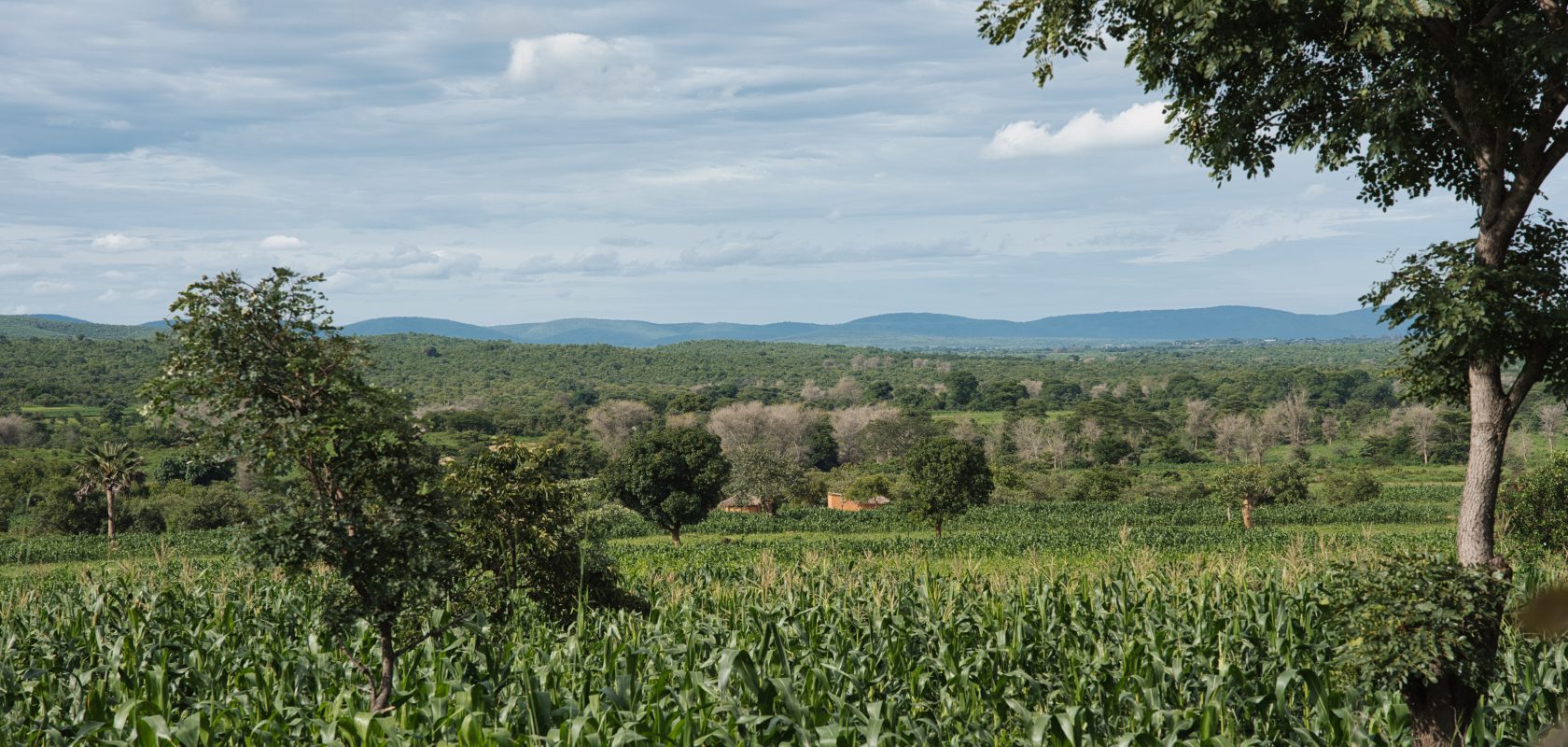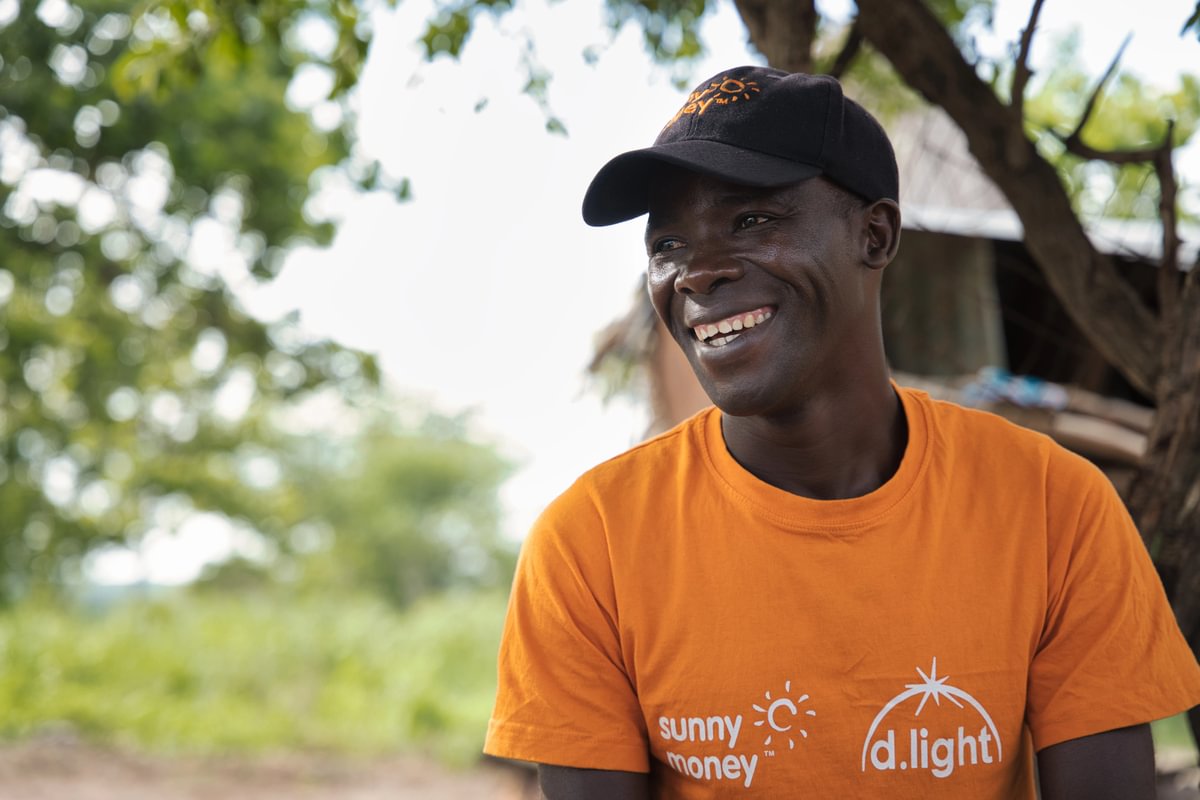
Mengezi N’Cube. Photo: SolarAid/Jason Mulikita
Up on top of a lush hill in Kan’gome Village, in Chongwe District, Zambia, lives solar entrepreneur Mengezi N’Cube with his wife, Elina (29), and their two children, Seth (6) and Levy (3).
With a view over the valley below, Mengezi sits in the shade under a large tree. Birds chirp around him, and small goats leap across the yard. In his friendly and soft-spoken manner, Mengezi expresses his love for the peace and quiet of his home, where he has lived for the past five years: “It is so quiet, I just like it the way it is, the quietness of it. And the land, how the land is good for producing some of the crops.”
In the valley below, he tends a plot where he grows maize and sunflower seeds. It has been a difficult year, with Zambia experiencing its worst drought in decades, but things are improving. “At least this year, it is promising. This year, it seems like we can have something. Since the beginning of January, it has been raining.”
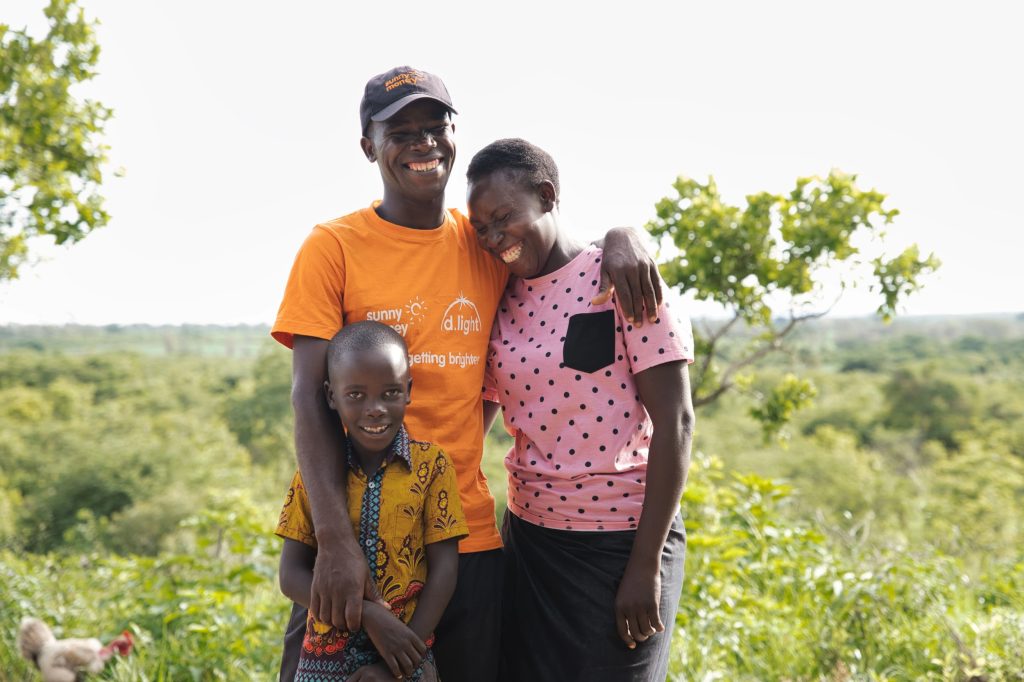
Mengezi together with his wife Elina and his son, Seth. Photo: SolarAid/Jason Mulikita
Mengezi has been a solar entrepreneur since 2022. “It was just a miracle. I came across SunnyMoney when I was on the road. They had parked their vehicle at the community clinic. I started talking with them. Then I asked one of them, ‘Can’t you have an agent around here? Because I feel like, for you to be coming here each and every time with a vehicle, you can’t find customers. You have come and parked here, but there are no people who can come, just because most people live far away in the villages.’ So they said, ‘If you are interested, you can be our agent.’”
After a few months of working, he decided to buy his own solar light. “It was some months after I signed up to become an agent. That’s when I got a home system. I said, ‘I can’t be selling solar lights to others without using them myself to see how good they are.’ I can remember what I did… The first day we set up the light, I kept switching it on and off to see how it worked. I felt good.”
Mengezi smiles as he recalls his first night with light. “Before we got that light, it was a challenge. We used to spend a lot of money buying candles. So it helped us save money. Because candles, as you know, melt. Sometimes we would buy one candle a day, especially when I had my firstborn. You know, if you have a baby, you can’t sleep. So it was a challenge buying a candle every day. They were expensive at that time.”
Now, with his job as a solar entrepreneur, life has changed. “With the economic challenges we faced, especially in providing food, this job has helped me. In fact, I bought some bricks to build a house from this business, and also some of the goats I have.”
But the work is not always easy—he has to travel far to reach remote communities. “When I was given the bicycle, I used to travel long distances, almost 10-11 kilometres a day. But without the bicycle, I could only reach nearby villages. I left it at the roadside for repair.”
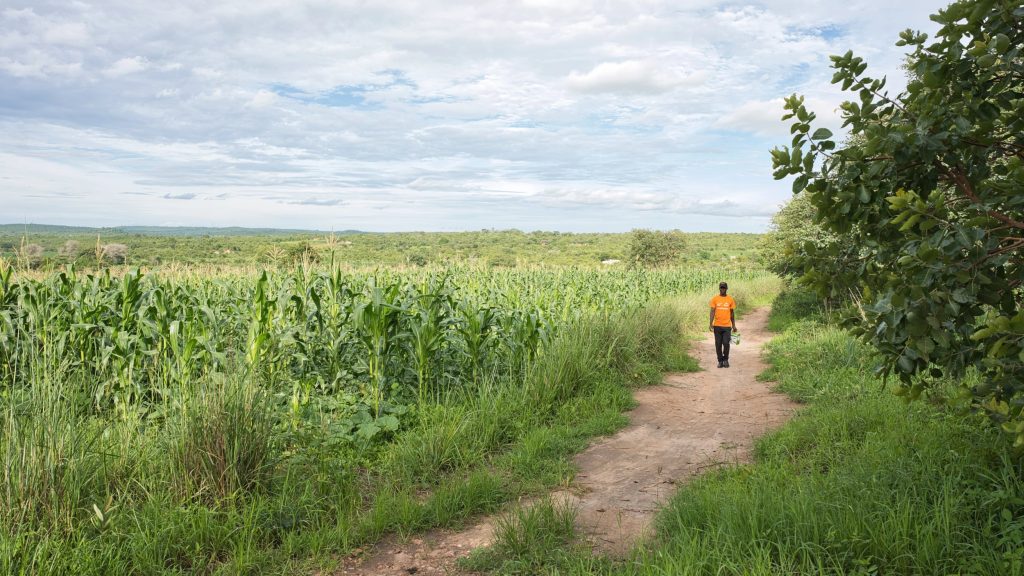
Since his bicycle broke, Mengezi delivers stock to his customers by walking long distances. Photo: SolarAid/Jason Mulikita
Over the years, Mengezi has developed a refined sales technique. “When I meet people who don’t trust the solar lights I’m selling, I just insist they buy one. ‘After buying, use it. Then, if it doesn’t work the way you expect, I’ll bring back your money and take back the light.’ Mostly, I know that won’t happen. They don’t return them.
That’s because I trust those lights. That’s why I tell them that. I know they won’t disappoint me. When they buy one, after just a week, they call me and say, ‘You know, your lights are good; you can bring more.’”
“Especially with this drought, people are now seeing that solar lights can help them more than they expected before these challenges.”
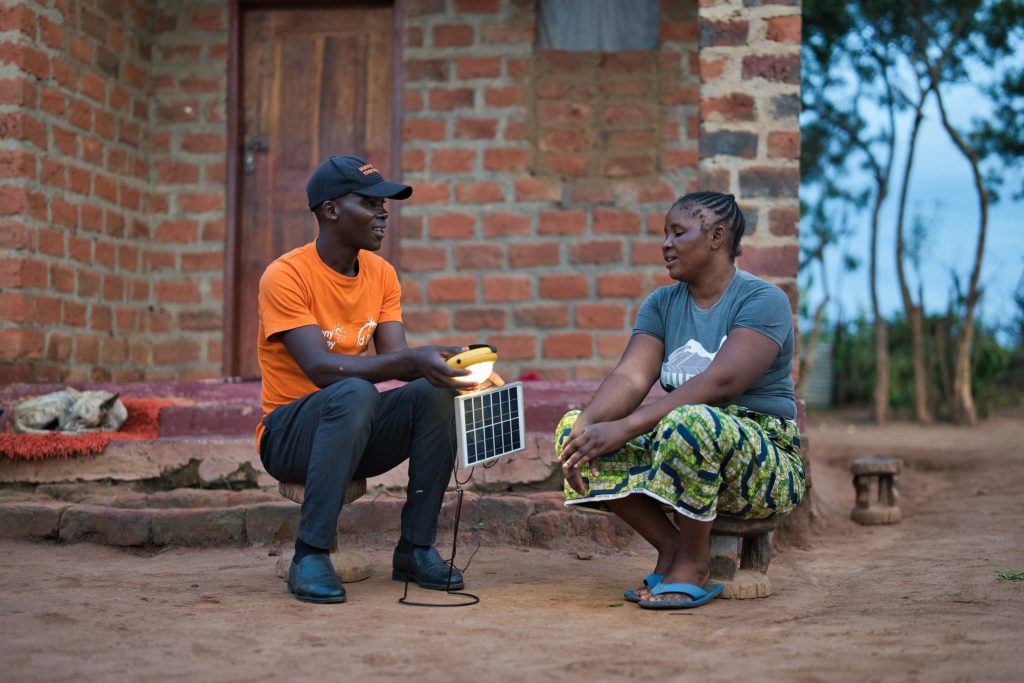
Mengezi together with his customer, Olive Hamasamu. Photo: SolarAid/Jason Mulikita
Last year, Mengezi was invited to a training session in the capital to learn how to repair broken lights. “With the repair kit we were given, it is now very easy to fix solar lights. Last time, I repaired almost ten.”
However, where he lives is completely off-grid, so some repairs have to be done at the roadside. It is five kilometres down a sometimes non-existent dirt road through the valley and bush. “Electricity is a challenge here. Since we don’t have it, I go and repair lights at the roadside because the soldering gun needs power. Some of my colleagues have a welding machine.”
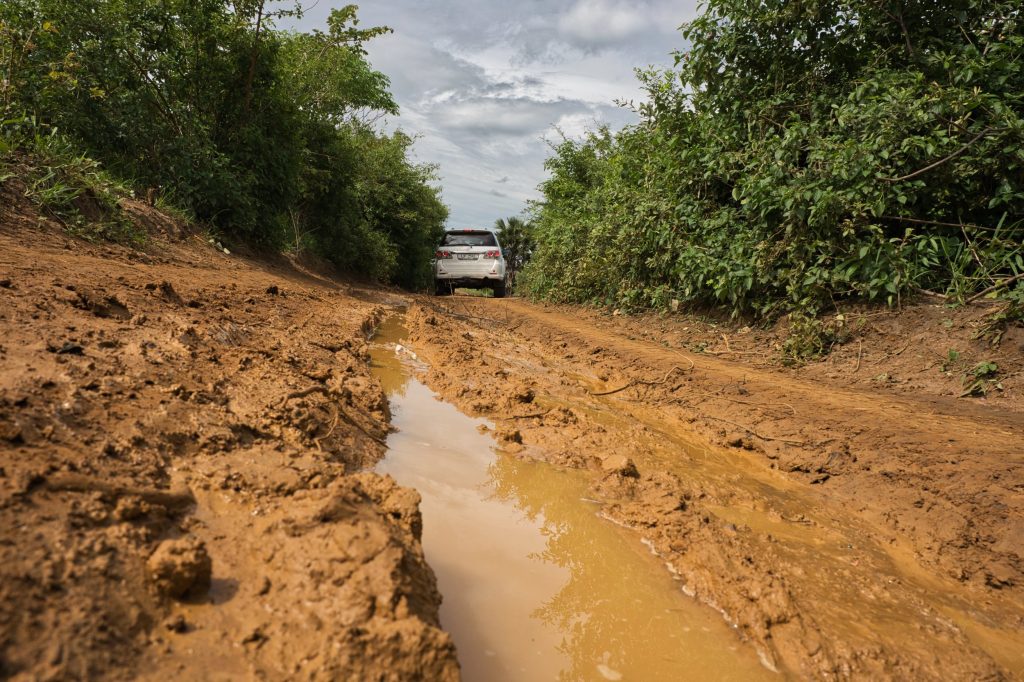
The roads leading to Mengezi’s house. Photo: SolarAid/Jason Mulikita.
As a child, Mengezi dreamt of becoming a doctor. “I had a passion for healing people and helping them with their challenges. That’s what I wanted to be.” Now, he has found another way to heal. “I write songs. I had the passion for writing when I was young, at school. But I didn’t write as much as I wanted to.” One of his songs was recorded at a studio in the nearby town of Chongwe. He enjoys sharing his songs, which are mostly gospel, with his church choir.
“I write in the evenings, especially at night. When I wake up around 1 or 2 am, I start thinking about how the world is and how people live. After that, sometimes a song just clicks in my mind. I start writing. That’s how I write. I record them on my phone. After recording, I teach my wife, and I teach my fellow singers too.”
With his positive outlook on the future, Mengezi also worked as a volunteer at a school, teaching preschool children. “I used to play with them and teach them from the books they brought. I was very interested in teaching them morals—how to live, respect themselves, and grow to become responsible adults.”
In his own children, he sees a future mathematician and a journalist. “He loves asking questions. When we are doing something, he’s always there, asking, ‘How have you done this? Why have you done this?’”
Looking ahead, Mengezi is optimistic. “I think we can achieve a lot in our country. Yes, we can do things that seem unexpected. We can be productive, we can achieve, and in fact, we can upgrade our economy.”
You can support more solar Entrepreneurs such as Mengezi – give a gift today.
